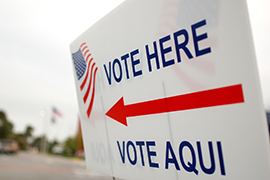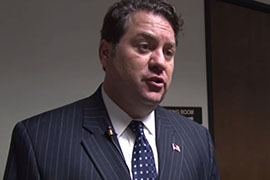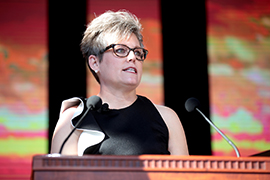- Slug: BC-CNS-Ballot Dispute,970
- 3 photos, video story available (thumbnails, captions below)
By Sarah Oven
Cronkite News
WASHINGTON – Arizona Attorney General Mark Brnovich told the Supreme Court Tuesday that voting laws struck down for reflecting the state’s “long and unhappy history of official discrimination” are really no more than “common-sense and commonplace” voting protections.
But critics argue that Arizona laws banning ballot-collection and out-of-precinct voting impose substantial burdens on Black, Latino and Native American voters who have been intentionally targeted for suppression by state lawmakers.
At stake is more than just the two Arizona laws – the high court’s ruling in the case will affect enforcement of a section of the Voting Rights Act that prohibits race-based restrictions on voting.
“The arguments put forth by the attorney general at the Supreme Court would really literally gut section 2 of the Voting Rights Act,” said Arizona Secretary of State Katie Hobbs, who finds herself on the opposite side of the issue from Brnovich.
At issue is a state law that makes it a felony for anyone other than a family member to collect and turn in another person’s absentee ballot. The case also concerns a longstanding state policy that rejects the entire ballot of any person who voted in the wrong precinct even if some of their votes – for statewide office, for example – may have counted regardless where they voted.
The Democratic National Committee sued, claiming those rules violated Section 2 of the Voting Rights Act because they burdened minority voters who were more likely to live in areas where postal service and transportation are difficult.
A federal district judge disagreed and upheld the laws in 2018. But that ruling was overturned in 2020 by the full 9th U.S. Circuit Court of Appeals, which said the laws “have a discriminatory impact on American Indian, Hispanic and African American voters in Arizona” in violation of Section 2.
The state appealed, claiming that whatever burden is imposed by the restrictions is race-neutral and not substantial enough to qualify as discriminatory. Brnovich argued Tuesday that the voting policies were needed for the “sacred duty” of protecting the right to vote and maintaining public confidence in the results.
“Requiring in-person voters to cast their ballots at assigned precincts ensures that they can vote in local races and helps officials monitor for fraud,” Brnovich said. “Restricting early ballot collections by third parties, including political operatives, protects against voter coercion and preserves ballot secrecy.”
Not all the justices appeared swayed by that argument. Justice Sonia Sotomayor challenged Michael Carvin, who was arguing on behalf of the Republican National Committee, when he said “ballot-harvesting” bans are needed to prevent voter fraud.
Sotomayor pointed to the district court ruling, which found “no meaningful threat that ballot collection leads to fraud. It found no meaningful threat whatsoever.”
Sotomayor also pushed back against Carvin’s claim that the laws did not have a discriminatory impact on minority voters.
“If you can’t vote because you are a Native American or a non-Hispanic in areas where car ownership rates are very small, where you don’t have mail pickup or mail delivery … or you happen to vote in a wrong precinct because your particular area has a confusion of precinct assignments,” she said, “if you just can’t vote for those reasons and … your vote is not being counted, you’ve been denied the right to vote, haven’t you?”
The case comes as state lawmakers across the country are rushing to impose new limits on voting in the wake of the 2020 election – limits that will be challenged under the high court’s new interpretation of Section 2. It also follows a decade in which more voting restrictions have been enacted “than at any point since the end of Jim Crow,” according to one attorney in the case.
“The last three months have seen an even greater uptick in voting restrictions, many aimed squarely at the minority groups whose participation Congress intended to protect” when it passed the Voting Rights Act, said Bruce Spiva, who was representing the DNC.
Those new laws are what have Hobbs more concerned about how the court will rule.
“Many legislators spent the months following the election helping to spread the misinformation and baseless allegations about fraud during the election and are now using that as justifications to present these bills to ‘restore’ that confidence of the voters, which they themselves help to undermine in their post-election actions,” Hobbs said.
Hobbs said those bills would mark a regression of voting rights.
“During the pandemic, we were able to do a lot of innovative things that help voters show up, and we should be figuring out how we can institutionalize a lot of these things and not take us backwards,” Hobbs said.
But Elijah Haahr, a Republican and former speaker of the Missouri House, said the court’s ruling will at least give the states some guidance.
“What we want is some clear guidance as we consider election regulations and rules,” Haahr said. “Which way do we go, do we have to look at the statistical disparity or not?”
Ilya Shapiro, director of the Robert A. Levy Center for Constitutional Studies at the Cato Institute, agreed that a ruling is needed because current “standards that courts are supposed to apply when evaluating such lawsuits are unclear.”
“That’s the key thing here because if it remains kind of what’s been a totality of the circumstances test, then we’re going to see a lot of litigation going forward ahead of the next presidential and midterm elections,” Shapiro said.
Whatever the court decides will determine more than the fate of the Arizona laws, but will set the standard for future claims of racially motivated voting laws under Section 2, he said.
“Even beyond what happens in particular with these two laws, people are looking at this case ahead of the 2022, 2024 elections to see what kind of litigation might happen,” he said.
For more stories from Cronkite News, visit cronkitenews.azpbs.org.
^__=
Web links:
_ Court arguments audio: https://www.c-span.org/video/?507934-1/brnovich-v-dnc-consolidated-oral-argument
_ Court arguments transcript: https://www.supremecourt.gov/oral_arguments/argument_transcripts/2020/19-1257_3ea4.pdf
_ Section 2, Voting Rights Act: https://www.justice.gov/crt/section-2-voting-rights-act#sec2
_ Circuit court ruling: http://cdn.ca9.uscourts.gov/datastore/opinions/2020/01/27/18-15845.pdf
_ Ballot-harvesting law: https://www.azleg.gov/legtext/52leg/2r/laws/0005.PDF
_ Arizona Elections Manual: https://azsos.gov/sites/default/files/2019_ELECTIONS_PROCEDURES_MANUAL_APPROVED.pdf
^__=
The Arizona case is being watched across the country, since the Supreme Court’s decision could make it harder for advocates to challenge voting restrictions that are currently being pushed in many state legislatures.. (Photo by Erik (HASH) Hersman/Creative Commons)
Arizona Attorney General Mark Brnovich argued that state limits on ballot collection and out-of-precinct voting are not a burden on minority voters, but safeguard the process. (File photo by Maria Thompson/Cronkite News)
Arizona Secretary of State Katie Hobbs said that Brnovich’s arguments, if accepted by the Supreme Court, would “literally gut” part of the Voting Rights Act aimed at preventing discrimination. (Photo by Gage Skidmore/Creative Commons)


